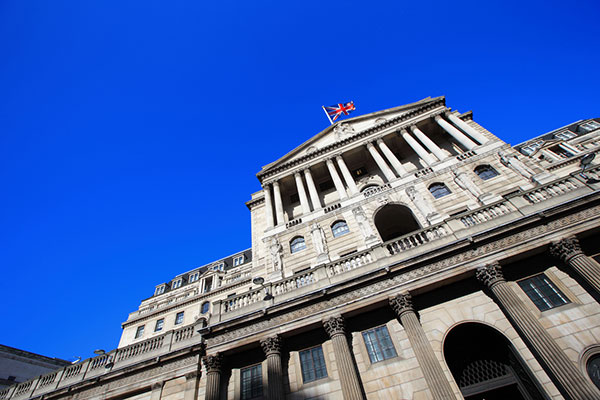The pros are expecting another UK interest rate rise in February
Increasing interest rates is an attempt to cool UK inflation, which is at a 30-year high.
28th January 2022 10:05
by Kyle Caldwell from interactive investor
Increasing interest rates is an attempt to cool UK inflation, which is at a 30-year high.

Fund managers and economists are expecting the Bank of England to make its second interest rate rise next week in an attempt to cool inflation.
The Bank’s Monetary Policy Committee will convene on 3 February, while in March the US’ Federal Reserve will meet and is expected to follow suit.
Inflation was expected to be a temporary phenomenon in response to the global supply chain problems that have materialised since the re-opening of economies following lockdowns. However, inflation has intensified and been sustained for longer than central bankers had been expecting.
In the UK, inflation (as measured by the Consumer Prices Index) is running at 5.4%, which is a 30-year high. Across the pond in the US, inflation is at 7%, its highest level since 1982.
Phil Milburn, joint manager of the Liontrust Strategic Bond fund, told interactive investor’s Funds Fan podcast: “To put my neck on the line, I think the Bank of England will raise rates at their February meeting. It would take some big news for them to not raise rates, for example, a new variant or big unforeseen event.”
- Funds Fan: Terry Smith, core-satellite tips, and 2022 bond outlook
- Tactics the pros use to combat rising levels of inflation
- A guide on how investors can protect against inflation
Milburn explained that what has changed in recent months is that the bond market has moved to accept that inflation is stickier than central bankers had forecasted.
He added: “I’m very much in the camp that inflation will be sticky for the next few years. Federal Reserve chair Jerome Powell retired the word 'transitory' late last year. It’s great if you can decide you don’t like a word anymore, so you retire it. So, it seems to me to a certain extent, that the argument on stickiness has been won.
“UK inflation has not yet peaked. It is likely to peak in April when the energy price cap increases come through. Roughly, inflation is likely to be one percentage point higher than current levels.”
James Lynch, fixed-income investment manager at Aegon Asset Management, also expects an interest rate rise next week. He said: “The labour market is key for the Bank of England’s medium-term outlook on inflation. If the signs are there for wage rises in the future, then inflation is going to be longer lasting than what is currently being driven by spiking energy prices.
“With inflation still to rise further over the next three months and Covid-19 restrictions being eased - which will help economic activity - plus a tight labour market, we expect the Bank of England to raise interest rates to 0.5% in its next Monetary Policy Committee meeting on 3 February.”
Melanie Baker, senior economist at Royal London Asset Management, says “the pressure is building for another rate rise from the Bank of England in February”.
She added: “UK inflation is expected to rise sharply, with another jump in energy bills expected in April when Ofgem resets the energy price cap.
“In the meantime, prospects of higher interest rates, high rates of inflation and pay growth that is not keeping pace means the financial situation of many households will be worsening. The chances of a strong year for real consumer spending are dimming further.”
- Our outlook for 2022: key topics and investment ideas for the year ahead
- Watch our latest fund manager interviews by subscribing for free to the ii YouTube channel
Rate rises, however, are likely to be small and will not return to pre-financial crisis levels. Peter Spiller, fund manager of Capital Gearing (LSE:CGT), points out that the Bank of England does not have a lot of flexibility to raise interest rates significantly due to high household debt levels.
“They are constrained because debt levels are so high. In the UK, you could not see interest rates at 4%, for instance, without the housing market falling over and causing huge banking problems,” he says.
The same point is made by Andrew Bell, fund manager of Witan (LSE:WTAN) investment trust. He said: “Rising rates are intended as a signal by central banks that they are determined to curb inflation, but it seems unlikely they will rise very far. This would (given debt levels in the economy) risk a recession that central banks are keen to avoid, as societies recover from the pandemic.
“So, rather than ‘speak softly but carry a big stick’ they appear to be talking loudly but carrying a pea-shooter.
“Overall, a growing economy with interest rates remaining low looks more rewarding for equity investors, although there will be winners and losers, than bond investors, who may struggle to maintain the purchasing power of their capital.”
These articles are provided for information purposes only. Occasionally, an opinion about whether to buy or sell a specific investment may be provided by third parties. The content is not intended to be a personal recommendation to buy or sell any financial instrument or product, or to adopt any investment strategy as it is not provided based on an assessment of your investing knowledge and experience, your financial situation or your investment objectives. The value of your investments, and the income derived from them, may go down as well as up. You may not get back all the money that you invest. The investments referred to in this article may not be suitable for all investors, and if in doubt, an investor should seek advice from a qualified investment adviser.
Full performance can be found on the company or index summary page on the interactive investor website. Simply click on the company's or index name highlighted in the article.